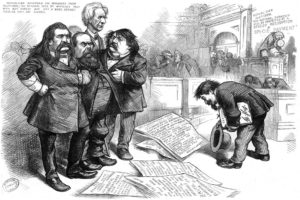Governments Fail to Protect Whistleblowers
From the early muckrakers in 19th and early 20th century America to the secret source of the Panama Papers, individual journalists, disgruntled workers, and average citizens have brought to light the secrets kept behind closed doors in corporate and government institutions. In doing so they have enriched the national discourse in their respective countries and provided a needed public service. Many, however, argue that whistleblowers harm national security and violate privacy protections when they reveal such secrets to the public at large. Unsurprisingly, those who have benefited from such secrets do not take kindly to those who seek to alter the status quo. Recent events suggest that few protections exist for whistleblowers who face retaliation.
In 2014, a scandal known as Cashgate unfolded in Malawi, in which government officials provided hundreds of millions of dollars in fraudulent payments to various businessmen who delivered no services in return. The scandal roiled the country, as citizens lost trust in the government and donors suspended aid payments. Yet the corruption underlying the scandal did not cease and continued to affect various public institutions, including the healthcare system. These facts came to light due to the efforts of Donnex Banda, the executive director of the Youth Health Network in Malawi. Banda uncovered evidence indicating corruption at the public Bwaila Hospital, such as an instance in which a district health officer used public funds to pay a company he may own for expensive catering. Instances of fraud has crippled the hospital, which is now unable to provide food for its night staff or even its patients. Yet Banda has suffered for his actions: the government arrested him this past August, claiming he failed to honor his bail conditions for a previous arrest—a claim contradicted by previous assertions that his arrest occurred because he intimidated hospital staff. Civil society groups have called for his release, to no avail.
Several thousand miles away from Malawi, Australia’s migrant detention policy remains a black mark on an otherwise splendid record. In matters of political and civil liberties, Australia receives high marks from international institutions, including a freedom rating of 98 out of 100 by Freedom House. The Human Rights Watch and the United Nations have decried the treatment of refugees and other migrants in a number of detention centers, claiming that the conditions constitute a violation of human rights. Much of the knowledge of this treatment came to light thanks to Paul Stevenson who worked for PsyCare, a company in charge of counselling efforts at Australian-run detention centers in countries such as Papua New Guinea and Nauru. After viewing the conditions at the detention centers, Stevenson spoke out to media outlets like The Guardian, documenting the abuses, which he described as an “atrocity”. PsyCare fired Stevenson and further repercussions could occur due to Australia’s Border Force Act. The act makes it a crime punishable by imprisonment for any individual employed by the Border Force or any connected contractors to publicly discuss conditions at the centers, including calls for better healthcare or reports of sexual abuse. The Australian government has not yet attempted to prosecute Stevenson. However, previous treatment , of whistleblowers suggests that he and those like him will continue to face risks should they reveal injustice.
In 2009, Ana Garrido, a civil servant at the council in Boadilla Del Monte in Madrid, provided evidence to a judge revealing corruption within the Partido Popular (PP), the ruling party of Spain at the time. The evidence showed that PP officials, including the mayor of Boadilla, used their power to unlawfully favor a network of firms in various business contracts. Her evidence helped the prosecution bring 37 PP officials to trial this month, yet the backlash has tarnished her image and negatively affected her life. Her bosses began to harass her in her professional life by halting her projects and excluding her from meetings. She began to receive death threats and claims that some tried to “drive [her] off the road”. She has little recourse, since Spain, unlike most European countries, does not have whistleblower protections built into law. Although she recently gained some positive recognition for her role in the corruption proceedings, her story provides a grim example of the price whistleblowers pay as part of their efforts to help their fellow citizens.
These examples do not act as exceptions, but rather illustrate a common norm: in most areas of the world, a lack of protection makes it difficult for whistleblowers to provide the public with information about illicit or illegal activities carried out by public or corporate entities without facing severe consequences. This reality pressures individuals who would otherwise come forward into remaining silent. Not every whistle blower has the near-celebrity status of Julian Assange or Edward Snowden that provides them with powerful patrons who can protect them. If citizens do not pressure their governments to improve legal recourses for whistleblowers, they will remain in the dark while the corruption embedded in governments and other entities continues unabated.
